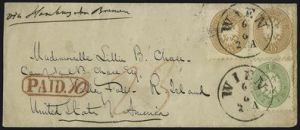Lillie B. Chase of Valley Falls, Rhode Island

1863 envelope to Valley Falls, RI
In about 1863 Mademoiselle Lillie B. Chase received a letter from Vienna, Austria, sent in care of Saml. B. Chase, Esq, of Valley Falls, Rhode Island. The letter was addressed to Mlle. "Chase" although the family spelled the name "Chace."Image used by permission of PHILGEN: Philatelic Genealogy. To see it there, click on Search Database in the left column and enter "Valley Falls" in the search box. The image originally appeared in the Robert A. Siegel Auction Galleries, Sale 945, Lot 3596.
Who was Lillie B. Chace, and who were the Chaces of Valley Falls, Rhode Island?
A rather prominent family in the area, as it turns out. Lillie's father, Samuel B. Chace was a mill owner whose first venture in Fall River, Massachusetts, had failed in 1837. Fifteen years later, after his cotton mill in Valley Falls had become successful, he and his brother sought out their creditors and repaid them.Lillie Buffum Chace Wyman, Arthur Crawford Wyman, Elizabeth Buffum Chace, 1806-1899: her life and its environment (W.B. Clarke Co., 1914, now a Google eBook), Chapter 4. Samuel was a Quaker and a firm abolitionist from 1835 onward. William Lloyd Garrison gave the eulogy at his funeral in 1870, noting that the Chace home "was converted into a station-house on the branch of the underground railroad running from New Bedford to Canada; and no efforts were wanting on his part to make it a safe retreat."Lillie Buffum Chace Wyman, Arthur Crawford Wyman, Elizabeth Buffum Chace, 1806-1899: her life and its environment (W.B. Clarke Co., 1914, now a Google eBook), Chapter 16.
Lillie's mother, Elizabeth (Buffum) Chace, was also a Quaker and abolitionist. In fact she felt so strongly about slavery that she resigned from the Society of Friends on 'the 28th day of the 11th month of 1843', with these words: "After months of serious deliberation ... I have arrived at the conclusion that it will no longer be right for me to remain a member of your body... The pro-slavery position assumed and maintained by New England Yearly meeting, and consequently by its subordinate branches, has, for many years, been a subject of painful regret to my mind ... and now, one and all, I bid you an affectionate farewell."Lillie Buffum Chace Wyman, Arthur Crawford Wyman, Elizabeth Buffum Chace, 1806-1899: her life and its environment (W.B. Clarke Co., 1914, now a Google eBook), Chapter 5.
Elizabeth was also a pacifist and forbade her son Samuel from fighting for the Union. In the words of her daughter Lillie "her peace principles remained unabated in force. It was wrong to fight even 'to make men free.' She never in the least modified this opinion."Lillie Buffum Chace Wyman, Arthur Crawford Wyman, Elizabeth Buffum Chace, 1806-1899: her life and its environment (W.B. Clarke Co., 1914, now a Google eBook), Chapter 10.
Lillie B., whose proper name was Elizabeth Buffum Chace, continued in her mother's path. According to her biographer, Lillie published articles in the Atlantic Monthly on the injustices of the factory system and wrote articles for African American journals protesting racial violence and advocating interracial equality.Elizabeth C. Stevens, Elizabeth Buffum Chace and Lillie Chace Wyman: a century of abolitionist, suffragist, and workers' rights activism (McFarland, 2003), Introduction, as previewed at Google books.
Continued in Lillie B. Chase of Valley Falls, Rhode Island, part 2.